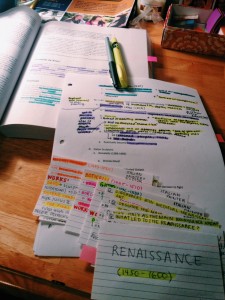Tests are announced usually a week ahead of time by your teacher. Mid-Term and Final Exams are set on the B.H.S. Calendar. If you have been diligent in using the SQ3R reading methodology and have been taking and reviewing your Cornell Notes then you are more than ready to employ the above revision techniques to be prepared for the announced test next week. Heck you are even ready for a “Pop” quiz since you have been reviewing and working with your Cornell notes for 10-20 minutes a day in each course of study. Exams are a cumulative assessment which may comprise an entire term’s content (Mid-Term) or an entire year’s content (Final Exam) therefore your timetable for revision must begin at least a month out. Why so early? Well you will not just have a Final Exam for one class; you will have final exams for each class in which you are enrolled. Further, the exam timetable runs over one week which means you can have up to two exams a day and at least one exam everyday for that week. While you have the afternoon and evening to “study”, last minute ‘cramming’ rarely yields positive, lasting results. Teachers will issue some guidance for your tests and exams. This may be in the form of rubrics and/or thorough study guides – these are worth their weight in gold since they will basically outline the contents of the assessment.
Rubrics and Study Guides
Throughout the course of study teachers will hand out rubrics and study guides. While some may be very detailed and other study guides are merely an outline, it is ultimately your responsibility to get prepared for tests and exams. By adopting the Cornell Note Taking system you have actually been preparing for quizzes, tests, and exams every night when you work with and review your notes. Your notes function as a progressive study guide so when you employ the revision techniques you are reducing and reworking the content in your own words. These mind-maps, cue cards, and other revision efforts fundamentally comprise your own study guide. All the better when a teacher provides a study guide for you and you will be pleasantly surprised to discover that much (if not all) of what the teacher has designated as important for the test you have already recorded and revised.
Rubrics are most task specific. As you will see throughout this handbook there are many “How to…” sections detailing how to respond to certain questions. This is not just ‘advice’, this is what the teacher is looking for in your written response. Further these rubrics basically lay out how your points/marks will be awarded. Therefore, when you are provided with a rubric you are provided with a blueprint for meeting, if not exceeding the standard for any given task. Since there are only so many question types which will be presented on assessments, it should not take very long to master these rubrics so that you will become expertly familiar with each question type used on all the assessments you will encounter at B.H.S. (and even in college).
How to prepare for tests
Not to oversimplify this nerve wracking situation, but the consistency and discipline used with both SQ3R and Cornell Notes is a process of continuous preparation. Clearly when you know you have a test next Thursday it will take some revision techniques specifically geared for that test to get you totally prepared, yet this will not take any more than an extra 10-20 minutes beyond your normal daily study period for that class. By being prepared daily through these methodologies tests are very manageable and are certainly nothing to get “stressed out” about.
How to prepare for exams
Exams are basically major tests. Realistically, exams only last 90 minutes, therefore there is only so much that can be asked of you in that time period. Since you will be in a state of continuous preparedness and you will be armed with an exam rubric and/or an exam study guide you will have a very good idea what to expect; it is just a matter of preparing and revision. The special nature of exams – six, seven, or even eight Final Exams in a one-week time period means you MUST begin your revision timetable early; at least a month in advance in order to be properly prepared. While the tendency is to review those topics you are very familiar with first, it is far more logical to (when you have the time to do so) start with the most problematic topics. Once that material is mastered satisfactorily (according to the study guide) then you can revisit the topics you already know very well as a bit of a self-esteem boost closest to the exam date.

